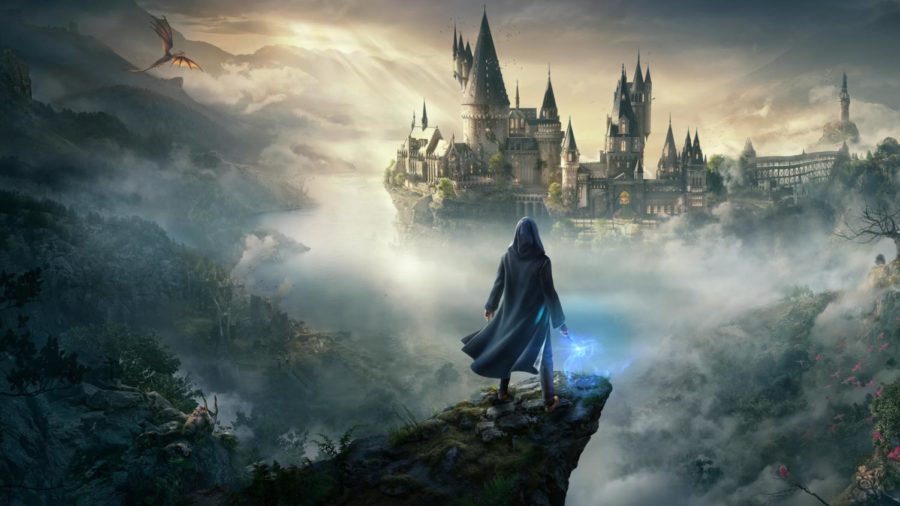Hogwarts Legacy: The dark cloud of controversy hanging over the wizarding world
Courtesy of Warner Bros. Games
“Hogwarts Legacy” is the current game dominating the cultural discourse, but it hasn’t been around its gameplay but rather J. K. Rowling, the creator of “Harry Potter,” and her controversial views.
February 17, 2023
The recent release of Warner Brothers’ “Hogwarts Legacy,” an open-world role-playing game set in the “Harry Potter” universe, has been riddled with controversy and ethical dilemmas. Reviews for the game—at least the ones that focus solely on the actual game—have been raving about “Hogwarts Legacy,” from the graphics to the actual quests and customization. And the option of becoming a dark wizard has certainly inspired its fair share of memes across almost every platform.
Despite the controversy surrounding the game, “Hogwarts Legacy” has smashed several game-related records. It already holds the second-largest player count in 24 hours for a PC game with 783,277 players as of Feb. 11. Sales for the first week have been up 80% from last year’s hit “Elden Ring.” 82% of sales have been on Playstation 5, with the remaining 18% split between Xbox and PC. “Hogwarts Legacy” is expected to continually decimate records, especially after it releases on the older generation consoles and the Nintendo Switch in April and July, respectively.
Although the premise of the game isn’t revolutionary, the game is itself teeming with magic. The open-world aspect of the game allows players to experience life surrounding Hogwarts in familiar locations like Hogsmeade and the Forbidden Forest and some that have never before been seen, like the Ravenclaw common room. The game follows a quintessential quest system, where your character follows a primary quest-line and the player approaches side characters to unlock others. In the game, quests can vary from doing various projects, to accessing new spells, to flying around the map and discovering new locations. With the addition of potion-making, herbology and magical creature zoology, there are hours of wizarding content for fans to enjoy. But access to the wizarding world comes at a moral cost.
The release of “Hogwarts Legacy” also comes with criticism about the ethics of participating in the “Harry Potter” universe in light of transphobic comments from creator J. K. Rowling. While the comments are unfortunately not a new development, Rowling has maintained her bigoted position regarding trans people. Warner Bros. has faced heavy backlash for continuing to release “Harry Potter” content amid the controversy over Rowling’s statements and in response have to remove Rowling from the creative process, specifically with “Hogwarts Legacy.” However, as it is her intellectual property, she will continue to profit off the franchise. They have also made minor attempts to mitigate the damage of Rowling’s comments, striving for more inclusivity across “Harry Potter” projects. “Hogwarts Legacy” features the first trans character in the franchise, Sirona Ryan, and the company has stated that they will continue to include more members of the LGBTQ+ community. Despite Rowling’s relative exclusion from the creative process, there is still a widespread boycott of the game for ethical reasons. Most people involved in the boycott don’t want to financially support Rowling, even if she was uninvolved in the process of making the game. Many have been vocal on social media about getting others to not support Rowling or the game, but some have taken the movement too far.
Critics of the game and Rowling’s beliefs have been harassing small content creators for playing or streaming “Hogwarts Legacy.” A website titled “Have they streamed that wizard game,” acted as a database for the names of all streamers who played the game. It was used to allow people who do not support Rowling to know which streamers to stay away from. However, it became used to harass those streamers. An account who streams and reviews games on Twitch, Girlfriend Reviews, found themselves at the receiving end of some of this criticism. The couple announced their intention to stream the game and immediately received criticism on Twitter. They later clarified that they did not pay for the game and were not supporting Rowling monetarily, but donating proceeds from the stream to The Trevor Project—an organization that focuses on the prevention of suicide among at-risk youths, specifically members of the LGBTQ+ community. Despite these statements, the couple faced heavy criticism during the stream. They even changed the chat setting to subscriber only, but people began paying for subscriptions just to harass them. The couple was then forced to abruptly end their stream when they were brought to tears over the hate messages they were receiving. While the desire to boycott the game is understandable and admirable, harassing small content creators, especially those who have not contributed to the franchise and who are actively donating to support at-risk groups, is completely unacceptable.
At the end of the day, the decision to play “Hogwarts Legacy” is an entirely individual one. Whether you are able to separate the game from J. K. Rowling’s personal beliefs or don’t agree with participating in the franchise, it is ultimately up to each person to decide. If you’re interested in playing the game or just want to experience that childhood nostalgia again, you’re not a bad person. And we shouldn’t be harassing content creators who are doing their best to mitigate contributing to Rowling’s bigoted beliefs.
“Hogwarts Legacy” is available on PC, Playstation 5 and Xbox Series X and S for those who want to experience the magic. The game will also be released on other consoles later in the year so if you want to participate, but don’t want to buy a new console, there’s no need to worry.




